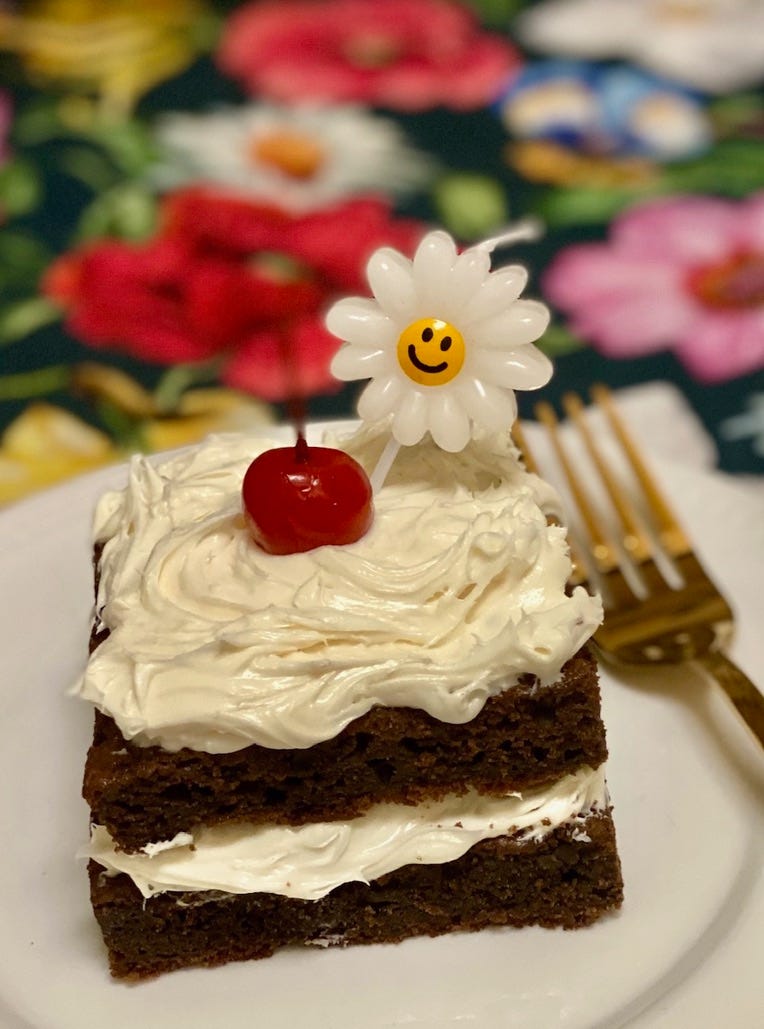June 1 newsletter
second year anniversary; delicious sentences (we need, as we can't eat the cake); prompt; from the archives; & more
Last year, Jolene of Time Travel Kitchen made us a chocolate anniversary cake. (Jolene has embarked on a lengthy-write historical project; take a look!)
It’s been two years since going “paid.” I’ve posted hundreds of pieces, and we’ve created workshops and community. I am most grateful for those who have chosen to actively support The Unschool. Thank you!
It’s not easy—I realize each of you is bombarded by requests for support every time you open your computer.
But since January, for every new paid subscriber, someone else has signed off. I don’t know all the reasons. Perhaps some simply can’t afford it. Others cite “time” as the reason. Writers tend to be a bit short on funds and busy, I know. I truly detest asking you to subscribe; I’ve been hoping there will come a time when I’ve reached my goal of 250 paid folks, and I can stop the asking! But I’m not halfway there—close, but not quite.
I see a lot of artists focusing on the “sales” and the tiktok/twitter stuff. But just can’t do that. Not when the energy expended on such can go into writing and connecting and doing something meaningful.
So if you’re reading consistently and getting something out of The Unschool, please consider going paid—
Let’s move on:
Delicious Sentences
How rich are your sentences?
These four sentences were shared with me by Caroline Adderson. If you have yet to find Caroline’s work on your bookshelves, fix that; she writes for all ages, and is one of Canada’s finest.
She’s also a role-model in terms of her daily work ethic—we can never go for a walk before 2:30—and what she brings to all of her offerings for this creative life, from her writing and editing work, to her commitment to other artists. I’ve gone to events at the Vancouver Writers’ Festival, when she’s been selected to facilitate panel discussions, and I know what goes on behind-the-scene: the time spent reading each participant’s works (WHO does that?), and the thought that goes into creating questions that build real exchanges and connection; for Caroline, there are no short cuts. Ever. She’s one of the most community-conscious writers I know, and it’s not about the “selling” piece for her (as I’m finding it is for so many). It’s about what it means to be a writer among other writers in our world.
Her most recent novel for adult readers was A Russian Sister, about Maria/Masha Chekhov, Anton Chekhov’s sister. Again, her research was meticulous (yes, she traveled!) and yet “hidden” within the fiction, in the way of an accomplished researcher. (Oh, it’s so tempting to show off all you’ve learned! Yet to resist is to understand that character and story are always first.)
We went for a walk recently and she told me about her recent re-read of Carol Shield’s The Orange Fish. We talked about how reads change over time (something to do with ageing?), and she mentioned writing out a number of sentences that caught her. I asked her if we could share a few here.
Sentences
“...ahead of them, in a space the size of this small table, waits a series of intricate compromises: impotence, rusted garden furniture, disordered dreams and the remembrance of specific events which have been worn smooth and treacherous as the stone steps of ancient buildings.”
~~~
“She felt she could see straight into his brain where there was nothing but rags and old plastic.”
~~~
“…we know for the first time, hearing the notes just as they came, unclothed out of another century when they were nothing but small ink splashes, as tentative and quick on their trim black shelves as the finger Madam Bessant raises to her lips...”
~~~
“After a while they rise, sigh with contentment, and go into the street, stepping carefully around fresh dog turds, plentiful and perfectly formed, lying everywhere on the roughened oily pavement.”
~~~
Caroline also shared a quote from Carol Shields that she keeps above her desk, passed on to her by Shield’s daughter, Anne Giardini. She says: “I used it in the intro to Best Canadian Stories 2019.” (Of which she was the editor):
‘I look first to language that possesses an accuracy that cannot really exist without tracing its deliberation. I want, too, the risky articulation of what I recognize but haven't yet articulated myself. And finally, I hope for some fresh news from another country that satisfies, by its modesty, a microscopic enlargement of my vision of the world. I wouldn't dare dream of asking for more.’
And she adds a note about another title you’ll want to look up: “Startle and Illuminate, the book of CS’s writing advice, compiled by Anne and her son, is excellent.”
Now you have more wonder-filled books To-be-read.
Thank you, Caroline!
Unschool writers, please share in the comments sentences that have stood out in your readings; let us know the source. And record in your process journal.
~~~
Prompt - sentences
For this month, let’s continue with the above, thinking about sentences, writing one, or starting with a phrase even. (This connects with the poetry discussion from April, about “words.”)
A couple of phrases that have been on my mind of late: (and could become sentences)
the sweaty smell of olives
the sweet smell of rust
Note how in each of Shield’s sentences, there are evocative couplings of concrete and intangibles.
My two phrases are of the senses (‘smell’ in this case) with “olives” and “rust.” Does either evoke an abstract, an emotion, a thought, for you? Borrow if you want. Or come up with something else completely.
Please post your phrases and sentences in the “June Prompt Thread.”
~~~
Let’s have some fun with the comments section—the prompts, the workshops!
We’ve had two poems posted in the workshop area, and two pieces that rather slipped by in the May prompt (‘phone booth’ stories). The workshop is only open to paid folks, but the prompts are always open to all. It’s never to late to post feedback as well as your own work! Take a look. We all know how discouraging it is to share work, and then hear crickets doing their cricket thing…
Writers can pay quite a bit to have their work read and critiqued; the Unschool workshops are a productive way to get some feedback. Anyone can post in the “prompt” areas each month. For the “workshop space,” you email whatever you want shared to me, and I do the posting. So far we have workshops in poetry, picturebooks, and short “scenes”—fiction or nonfiction.
My email for submission (or if you have a question) is alison@alisonacheson.com
(A note about privacy: please do not share any of the workshop pieces. It’s possible that the writers might want to publish these pieces at a later date, and if they are made public, they’ll be considered ‘previously published.’)
Indexes
For those new here, know that there are hundreds of archived pieces in three indexes, and within the indexes, all broken down to easy-to-find categories. You could spend weeks working with your own work, exploring topics and questions as you write and re-write.
Know that you can post work to the monthly prompts even if they’re two or three years old, and I will receive a notification, and happily take a look. I can’t promise that others will—only those who have had anything to do with that particular prompt will receive some notification. But the more active is the community… the more active it is!
For easy access, here are links to the indexes: 2021, 2022, and our current one, 2023.
From the archives
from July 2021
Taking it as Far as You Can
I recently saw No Direction Home, the Martin Scorsese documentary of Bob Dylan in early years, going to the UK and performing. A snippet of the film showed Dylan riffing off some “dog care” and more signs outside a store. It made me think about how creating grows in layers, and if you don’t jump in and
Re-cap of May Posts
The first-of-the-month newsletter, including thoughts on “stand up” to write, and with a “Phone Booth” as prompt.
I put out a request for “questions” and answered five in April, with three more posted in May, one about using creative nonfiction techniques in fiction, one about choosing between re-writing the story at hand or moving on to the next, and yet another about approaching draft #2.
The May Poetry Discussion looked at chapter 5 of A Poet’s Craft, by Annie Finch. Check out the thoughts on deschooling, unschooling, more formal education. And I included thoughts on verse novels, and included an example of how they work.
And last, a piece on being nice—or not—to your characters. Bad stuff really can happen to good people. And bad stuff does.
*Also check out Arthur Meeks’ piece “Colonial Goose,” from his newsletter “Citizens of Nowhere.” VERY timely that this showed up in my inbox the day before I posted this piece.
Poetry Market
Right here on Substack, the poetry counterpart to ShortStory:
May Poll - what are you listening to as your write?
Not surprisingly, most of you prefer silence. Only 5% listen to music with lyrics. There were a few votes for “other” and I wondered about what that sounds like: nature—waves? birds? open windows? neighbours’ conversation? coffee shops… ?? What sounds would most work for you?
If in the midst of a block, does it work to change it up? Has anyone tried this?
~~~
Conferences
Ah, this one—the Historical Novel Society—as recommended by Margie (thank you!) appears to be about to begin. In San Antonio TX, no less—an amazing place. So you might be late this year, but note it for next.
https://hns-conference.com/
Please add more suggestions to this list. Do let us know what it is that really worked for you. Include only conferences you have experienced.
~~~
Poll for June
If I were to post only once a week, what day of the week would you prefer? I’m asking because I’ve had people leave, citing “time” as the reason, and I’m wondering if I post too often. (No, I’m not committing… but am curious. And I know I’m overwhelmed by Substack emails flooding in Friday mornings, for instance!)
Then again, maybe you’re happy receiving posts every five days or so—which is what I have been doing. And if so, leave a note in the comments to let me know. Thank you.
Here we go into summer. We’re back in the campervan, heading for the Rocky Mountains, looking forward to hiking time and writing in the van and the open air.
Writing alfresco!
Does that work for you?




I like reading what others have written, and the comments made. Useful. I also like to read what others got out of a piece. Educational. I just wish more would participate. I know my own writing gets very little feedback, which makes me feel it is just plain useless. If that's the case, tell me why!
Also, I have a whole stack of PB sentences that I consider Great First Lines. Maybe you'd be interested in those?